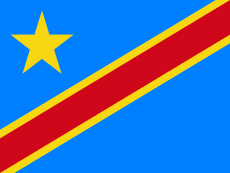Corruption in the Democratic Republic of the Congo
| Political corruption | ||||||||||||||
|---|---|---|---|---|---|---|---|---|---|---|---|---|---|---|
 | ||||||||||||||
| Concepts | ||||||||||||||
| Corruption by country | ||||||||||||||
|
||||||||||||||
Corruption in the Democratic Republic of the Congo, once legendary, has diminished in recent years, but continues to exceed corruption in most states. The BBC's DRC country profile calls its recent history "one of civil war and corruption."[1] President Joseph Kabila established the Commission of Repression of Economic Crimes upon his ascension to power in 2001.[2]
History
Mobutu Sese Seko ruled Zaire from 1965 to 1997, looting his country's wealth for personal use to such a degree that critics coined the term "kleptocracy". A relative once explained how the government illicitly collected revenue: "Mobutu would ask one of us to go to the bank and take out a million. We'd go to an intermediary and tell him to get five million. He would go to the bank with Mobutu's authority, and take out ten. Mobutu got one, and we took the other nine."[3] Mobutu institutionalized corruption to prevent political rivals from challenging his control, leading to an economic collapse in 1996.[4] Mobutu allegedly stole up to US$4 billion while in office.[5]
In 2017, Reuters unveiled a scheme involving overpriced biometric passports.[6]
Corruption Perception Index
| Year | Ranking | Countries ranked | Rating | |
| 2004 | 133 | 145 | 2.0[7] | - |
| 2005 | 144 | 158 | 2.1[8] | - |
| 2006 | 156 | 163 | 2.0[9] | - |
| 2007 | 168 | 179 | 1.9[10] | - |
| 2008 | 171 | 180 | 1.7[11] | - |
In 2015 Transparency International ranked the DRC 147 out of 167 countries in the Corruption Perception Index, tying Chad and the Republic of the Congo with a score of 22/100.[12]
The Kabila Regime
Although the Commission of Economic Crimes was implemented in 2001 by President Joseph Kabila, his predecessor, Laurent-Désiré Kabila, led a regime that upheld corruption through clientelism by appointing his clients as cabinet members [13]. The Democratic Republic of Congo received a score of 1.9 out of 10 in the Corruption Perception Index, which reveals high levels of corruption [13]. Under the Kabila regime, the DRC has failed to pull itself out of its “collapsed state” status from when Mobutu was in power [14]. The regime has failed to implement security and human rights reforms, free media, and the decentralization of power [15]. The economy plummeted, forcing workers to be underpaid and living conditions to deteriorate [16].
Laurent Kabila led an insurgence group against Mobutu and quickly assumed power after Mobutu was overthrown[17]. The constitution was not changed, and he and his peers exploited resources for their personal benefit [18]. He was killed in 2001 by one of his body guards in an attempted coup d'état[19]. His son, Joseph Kabila was elected president after Laurent Kabila's death[17]. There are still reports of high ranking officials exploiting resources for their personal benefit [18]. Joseph Kabila is working with the World Bank to curtail corruption and improve economy[20].
See also
References
- ↑ "DR Congo country profile". 10 February 2016. Retrieved 29 July 2016.
- ↑ Werve, Jonathan (2006). The Corruption Notebooks 2006. p. 57.
- ↑ Ludwig, Arnold M. (2002). King of the Mountain: The Nature of Political Leadership. p. 72.
- ↑ Nafziger, E. Wayne; Raimo Frances Stewart (2000). War, Hunger, and Displacement: The Origins of Humanitarian Emergencies. p. 261.
- ↑ Mesquita, Bruce Bueno de (2003). The Logic of Political Survival. p. 167.
- ↑ "Congo's pricey passport scheme sends millions of dollars offshore". 13 April 2017. Retrieved 14 April 2017.
- ↑ 2004/cpi/surveys_indices/policy_research
- ↑ 2005/cpi/surveys_indices/policy_research
- ↑ 2006/cpi/surveys_indices/policy_research
- ↑ 2007/cpi/surveys_indices/policy_research
- ↑ 2008/cpi/surveys_indices/policy_research
- ↑ e.V. "Transparency International - The Global Anti-Corruption Coalition". www.transparency.org. Transparency International. Retrieved 2016-11-04.
- 1 2 "The Democratic Republic of the Congo? Corruption, Patronage, and Competitive Authoritarianism in the DRC on JSTOR" (PDF). doi:10.2979/aft.2010.56.4.42.pdf.
- ↑ Reyntjens, Filip (2001). "Briefing: The Democratic Republic of Congo, from Kabila to Kabila". African Affairs. 100 (399): 311–317.
- ↑ Dizolele, Mvemba (July 2010). "The Mirage of Democracy in the DRC" (PDF). Journal of Democracy. 21: 143 – via National Endowment for Democracy and The Johns Hopkins University Press.
- ↑ Mills, Greg (February 2002). "Africa Portal". Africa Portal. Retrieved 2018-10-11.
- 1 2 Isango, Eddy (December 7, 2006). "Kabila Promises New Era for Congo" (PDF). Antigenocide.org.
- 1 2 Nguh, Augustin (December 2013). "Corruption and Infrastructure Megaprojects in the DR Congo" (PDF). International Rivers.
- ↑ Christensen, Christian (2004). "Political Victims and Media Focus: The Killings of Laurent Kabila, Zoran Djindjic, Anna Lindh and Pim Fortuyn" (PDF). Journal for Crime, Conflict and the Media. 2: 17 – via JC2M.
- ↑ "Democratic Republic of Congo" (PDF). United Nations.
External links